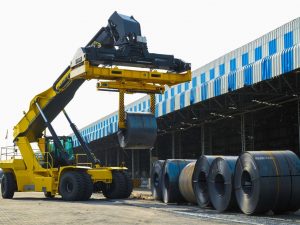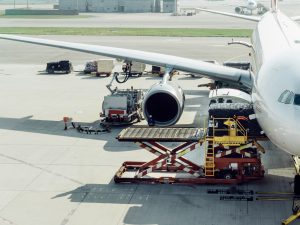DP World has launched a EXIM rail service linking Powarkheda, Madhya Pradesh to the Nhava Sheva container terminal in Mumbai. The twice-weekly service operates from DP World’s Multimodal Logistics Powarkheda (DP World Powerkheda) and is designed to speed up cargo movement, while reducing logistics costs and emissions. DP World’s Powarkheda, Logistics Composite Hub brings an ecosystem to customers, including spacious warehouses, an inland container yard, and a dedicated rail area that allows cargo to be loaded and unloaded directly from trains. It is equipped with a container repair facility to make the containers suitable for rice and garment cargo. The facility includes space for processing and manufacturing of agri products, modern cold storage with temperature-controlled modules to support sensitive cargo such as perishables, pharma, and agri-commodities. Together, these facilities at Powarkheda enable customers to carry out value-added services, storage, and rail movement to port from a single location, helping reduce delays, improve efficiency, and lower overall logistics costs through faster, coordinated operations, and reliable connectivity to gateway ports.
Read More »TVS ILP signs pact to build MMLP in Telangana
TVS Industrial & Logistics Parks (TVS ILP) has signed a pact with the Telangana government to acquire 20 acres of land to develop a tech-enabled logistics and industrial park in the state. Ramnath Subramaniam, Joint MD, TVS ILP, said, “Telangana’s investment climate and infra vision present an opportunity for high-quality logistics development. As a company with operations across southern India, we see the state as a hub in our national logistics network. Its vision and seamless execution make Telangana an attractive investment destination and we are proud to contribute to its emergence as a global industrial powerhouse.” This proposed investment aligns with the state’s vision of emerging as a leading manufacturing, warehousing, and logistics hub in India. The initiative would generate more employment opportunities and support supply chain and industrial growth across multiple sectors.
Read More »IICS 2025 kickstarts in Mumbai, fosters growth & innovation
The India International Cargo Show (IICS) 2025 kickstarted in Mumbai as the global air cargo community came together for the highly anticipated industry showcase. Recognised as a premier meeting point for logistics decision-makers, the first day highlighted the latest advancements, challenges, and opportunities shaping global airfreight. This year’s exhibition brought an impressive lineup of participants, including leading international forwarders showcasing new service capabilities, cargo airlines presenting network developments, and major airports unveiling infrastructure upgrades designed to enhance cargo flow. Technology companies also played a central role, introducing cutting-edge digital tools, automation solutions, and visibility platforms aimed at improving efficiency and transparency across the supply chain. Attendees experienced panel discussions, keynote presentations, and product demonstrations focused on digital transformation, sustainability, e-commerce growth, and the future of global logistics. As the industry continued to evolve in response to shifting trade patterns and customer demands, the exhibition provided a vital space for collaboration and strategic dialogue. With strong momentum throughout, the first day of IICS offered an invaluable platform for networking, innovation, and partnership-building—helping industry stakeholders shape the next chapter of airfreight. The exhibition will continue till 12th.
Read More »Hans Infomatic unveils WiseTrax to boost cargo efficiency
Hans Infomatic has launched WiseTrax, a logistics intelligence platform designed to support IATA agents, sub-agents, and airlines at the ongoing India International Cargo Show (IICS) 2025 in Mumbai. WiseTrax brings AWB stock control, eAWB transmission, and Air & Ocean shipment milestone tracking together in a single, secure system. Speaking at the launch, Parvinder Singh, MD, Hans Infomatic shared that WiseTrax was built after closely engaging with customers and observing their day-to-day challenges. WiseTrax aims to simplify repetitive tasks, improve visibility, and help teams make quicker, better-informed decisions. By unifying tracking, documentation, and operational workflows, the platform is intended to bring greater clarity and control to freight movement. “Our goal with WiseTrax is simple, give the industry a dependable, practical, and future-ready system,” said Singh, adding, Hans Infomatic believes WiseTrax will play a meaningful role in supporting the growing demands of global logistics and strengthening digital adoption across the sector.
Read More »Sumadhura Group inks pact to construct MMLP in Telangana
Sumadhura Group has signed an agreement with the Telangana government to boost infrastructure development, said Ramarao Kalakuntla, Vice-Chairman, Sumadhura Group. Under the pact, the Group will invest ₹600 crore over two years to develop a 100-acre Grade A+ Industrial Park, aimed at attracting global manufacturing firms and speeding up industrial growth in the region. The park will offer plug-and-play facilities for aerospace, automobile, pharma, and e-commerce sectors. It is also designed to meet global standards in infrastructure, environmental sustainability, and operational efficiency. “At Sumadhura, we believe world-class infrastructure is the foundation of sustainable industrial transformation. Supported by Telangana’s pro-growth policy climate, the investment will attract high-value industries, generate thousands of jobs, and catalyse meaningful economic impact. We are proud this project aligns with the State’s vision of becoming a US$ 3 trillion economy by 2047,” he added.
Read More »Volumes likely to grow 2.4% YoY this year: IATA
Cargo volumes in this year may increase 2.4 per cent year-on-year, according to IATA’s latest analysis. The trade body stated the volumes are expected to reach 71.6 million tonnes in 2026, noting that the “resilience in air cargo has been particularly impressive” within the context of the challenges the market has faced. Revenue is forecast to reach US$158 billion this year, up 2.1 per cent on US$155 billion this year. Revenue will be driven by time-sensitive shipments and e-commerce volumes. Despite forecast for volumes and revenue, cargo yields are expected to be down -0.5 per cent on 2025, although this is within the context of a slowdown in global trade and yields will still be approximately 30 per cent above pre-pandemic levels, pointed out IATA.
Read More »Menzies Aviation recognised as Silver Sponsor of ICA 2025
Menzies Aviation was recognised as a Silver Sponsor at the recent India Cargo Awards 2025, reaffirming the company’s commitment to advancing India’s air-cargo and logistics landscape. This recognition highlights the firm’s growing presence in the region and its continued efforts to support innovation, operational excellence, and industry collaboration. As the India Cargo Awards celebrate outstanding contributions across the sector, Menzies’ sponsorship reflects its dedication to partnering with key stakeholders and driving the future of efficient, sustainable cargo operations in India.
Read More »Agility, resiliency essential for growth in coming years: KN
Anish Jha, Managing Director, Kuehne+Nagel India (KN), Sri Lanka & Maldives said, “In 2025, the logistics industry showed that customer focus and collaboration remained the strongest drivers of progress. Companies strengthened agility, trust and visibility to keep supply chains steady in a changing environment. The year underlined that resilience is built through shared intent and partnerships, not forecasts. Three themes shaped how organisations navigated the year: Agility to respond, adjusting to fast changing market conditions, resilience to managing rising complexity, and trusting the basis of every customer relationship. Agility took many forms, from adapting production and inventory plans to rebalancing transport modes and reviewing sourcing strategies. The adjustments to USA tariffs were one example of how the firms needed to stay flexible, anticipate cost impacts, and ensure continuity across markets.”
Read More »CSC is Gold Sponsor of India Cargo Awards 2025
Cargo Service Center (CSC) was recognised as the Gold Sponsor at the recent India Cargo Awards 2025, reaffirming its leadership and commitment to excellence within the air cargo and logistics industry. This acknowledgment highlights the company’s ongoing efforts to drive innovation, enhance operational efficiency, and support the growth of India’s cargo ecosystem. As a valued industry partner, CSC continues to play a significant role in elevating service standards and contributing to the sector’s overall advancement.
Read More »Welspun One to open Grade A MMLP in Talegaon, Pune
Welspun One has been allotted 46-acre MIDC-notified land parcel in Talegaon MIDC Phase IV, Pune. The company will develop a 1.2 million sqft., Grade-A logistics park with a planned investment of `550 crore. This move marks Welspun One’s entry into one of India’s most promising logistics micro-markets and strengthen its presence in Maharashtra’s new-age warehousing corridor. This MIDC-notified land parcel is earmarked for developing a premium Grade-A first-mile logistics asset, designed to enable the seamless movement of goods from factories to fulfillment and distribution networks. Located in the Talegaon–Chakan belt, the site sits at the heart of one of India’s vital and sought-after industrial and warehousing micro-markets driven by occupier demand from warehousing and industrial users seeking proximity, scalability, and compliance-led infrastructure.
Read More » Cargo Breaking News
Cargo Breaking News









